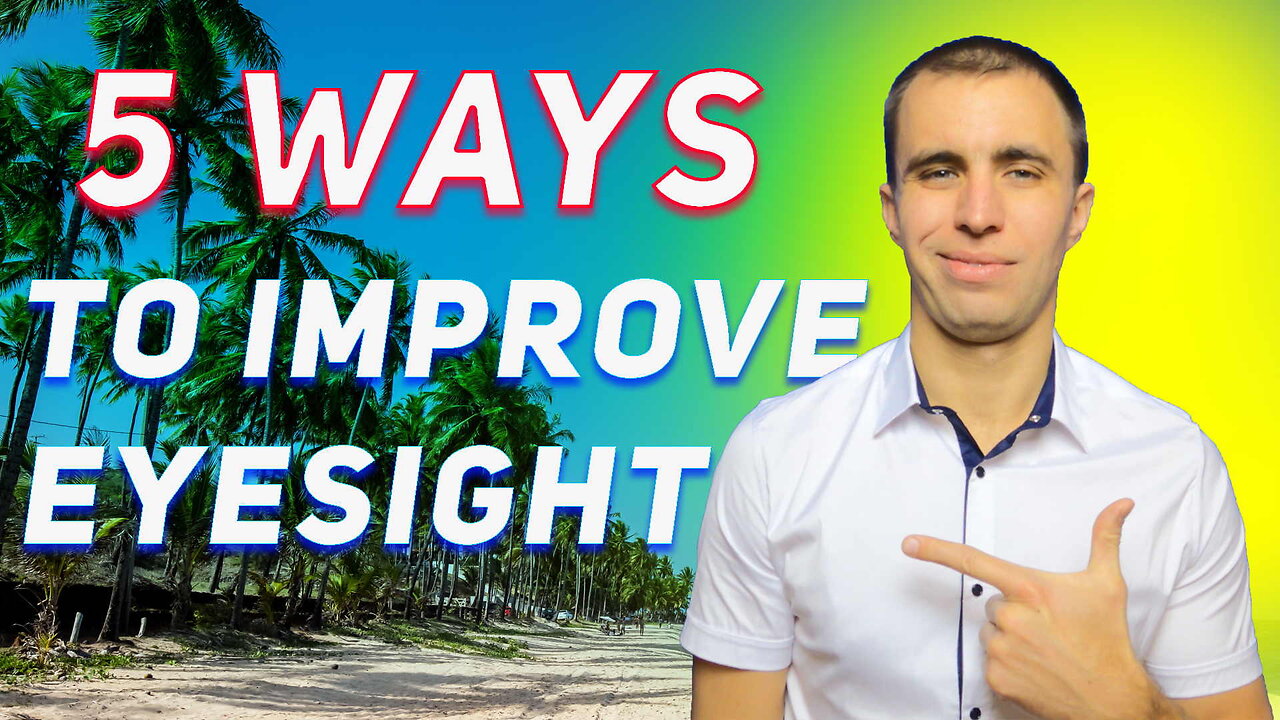Premium Only Content

5 Ways to Improve Your Eyesight Without Glasses Naturally
Improving your eyesight without glasses involves adopting healthy habits and exercises that can help maintain or even improve your vision health. While these methods may not work for everyone, especially those with significant vision impairments, they can contribute to overall eye health and potentially reduce reliance on corrective lenses for some people. Here are five ways to potentially improve your eyesight without glasses:
1. Practice Regular Eye Exercises
Eye exercises can strengthen the eye muscles, improve focusing, eye movements, and stimulate the vision center of the brain. Some simple exercises include:
Palming: Warm your hands by rubbing them together and then place them over your closed eyes without pressing. The warmth and darkness can help relax your eyes.
Focusing: Hold a pen at arm's length, focus your eyes on it, and slowly bring it closer until it's about 6 inches away from your nose. Then, slowly move it back. Repeat this exercise a few times daily.
2. Spend More Time Outdoors
Studies suggest that spending time outdoors can decrease the risk of developing myopia (nearsightedness). Natural light is beneficial for the eyes, and focusing on distant objects can help improve vision clarity. Aim for at least 2 hours of outdoor time daily, especially in green environments.
3. Maintain a Healthy Diet
Nutrition plays a crucial role in eye health. Consuming foods rich in vitamins and minerals can support vision. Key nutrients include:
Vitamin A: Found in carrots, sweet potatoes, and leafy greens, it's essential for good vision.
Omega-3 fatty acids: Present in fish and flaxseeds, they support cell health in the eyes.
Lutein and Zeaxanthin: These antioxidants, found in eggs and leafy greens, protect the eyes from harmful light waves.
Ensure Adequate Rest and Sleep
Adequate rest is essential for eye health. Sleep allows your eyes to fully rest, heal, and replenish so they're ready for the next day. Ensure you're getting enough sleep nightly—typically 7-9 hours for most adults—to help maintain eye health.
While these methods can contribute to healthier eyes and potentially improve vision, they're not guaranteed solutions for everyone. If you're experiencing significant vision problems, it's crucial to consult an eye care professional for personalized advice and treatment options. Regular eye exams can help detect vision changes and conditions early, allowing for timely intervention and care.
-
 17:40
17:40
VSiNLive
1 day agoHow a TWEET Made Steve Fezzik DOUBLE DOWN on this Vikings Rams Bet Amidst the California Wildfires
24.1K3 -
 22:20
22:20
DeVory Darkins
15 hours ago $6.13 earnedGavin Newsom Suffers HUMILIATING Blow by Trump
20.8K48 -
 24:15
24:15
Stephen Gardner
20 hours ago🚨New Evidence DESTROYS Gavin Newsom! Trump HITS BACK HARD!!
25.9K167 -
 14:59
14:59
TimcastIRL
2 hours agoH1-B Immigration ABUSED, You Cannot Import Your Way Out Of US Cultural Decay
20.2K29 -
 15:21
15:21
Forrest Galante
16 hours agoWorld's Deadliest Predator Up Close (Private Tour)
26.6K4 -
 2:49:49
2:49:49
BlackDiamondGunsandGear
12 hours agoBDGG live with DLD After Dark
3.95K2 -
 27:43
27:43
hickok45
5 hours agoSunday Shoot-a-Round # 263
4.11K6 -
 15:17
15:17
This Bahamian Gyal
15 hours agoTHEY REALLY hate Donald and Melania Trump!
2.4K7 -
 8:37
8:37
GBGunsRumble
15 hours agoGBGuns Range Report 11JAN25
1.75K2 -
 49:15
49:15
Weberz Way
15 hours agoWILD FIRES, LAND GRAB, ARSON, SLEEPER CELLS, WHAT A MESS IN CA!
1.51K